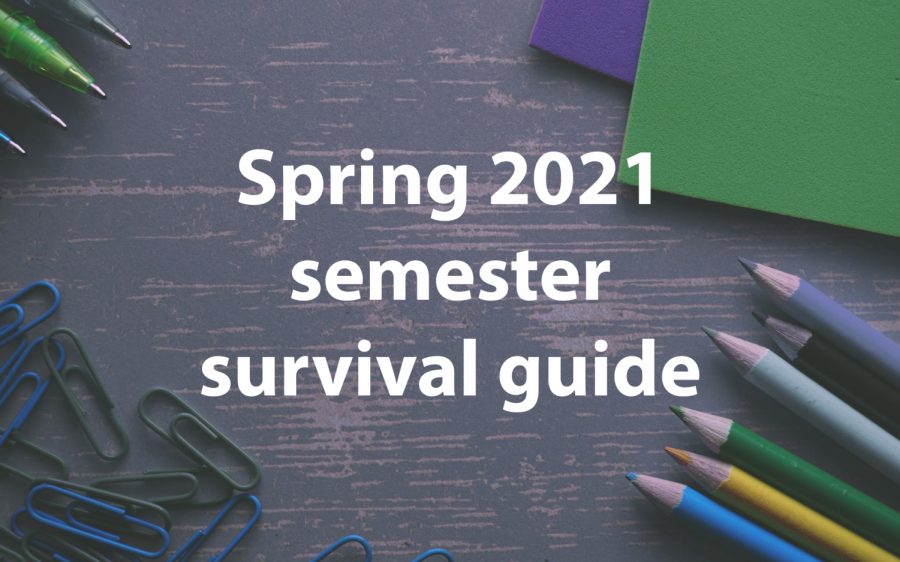6 tips for getting through spring semester
February 5, 2021
Classes are in session, but how prepared are students to conquer them? With 2021 presenting similar challenges when it comes to remote learning, here is a list of tips and methods to help students stay on track with coursework, minimize procrastination and ensure success this semester.
1. Set daily goals
Without assessing goals for the day, it’s easy for daily tasks to slip through the cracks. There’s nothing worse than the stress of lurking due dates or turning in assignments just barely on time. Daily goals provide a list of tasks that need to be accomplished according to their schedule.
The idea of having a fixed schedule may sound constricting, but it is a system that works by dedicating the time to work without rushing through. In setting goals, balance is key.
Keep due dates in mind as well as free time when mapping out the day’s agenda.
2. Communication is key
If a student needs help, even just to get a further understanding of something, they need to ask for it. If a student is overwhelmed or is going through an intense personal situation, communicating what’s going on may not be easy, but it will yield support and understanding from those around them.
Communication is as vital as ever when it comes to success, and for introverts and empaths alike, this isn’t always a comfortable acknowledgment. Sometimes guilt can arise from asking things of others, or when we are overwhelmed and don’t want to ask for help. However, if these boundaries aren’t set and you don’t communicate how you are feeling you’ll stray from the goals you need to meet.
When one becomes comfortable in facing the uncomfortable, nothing in their path can stop them.
3. Swap procrastination for timed 10-20 minute breaks
We avoid completing tasks simply because there are no excuses, nor penalties for not doing them right away. This is natural, but it often leads to problems. Too often we allow the mere idea of a task to become bigger than the action itself. Timing breaks between tasks, allowing 10-20 minutes to allow the brain some moments of relief can be an effective replacement for procrastinating. The will to face challenges head-on is a skill that becomes easier with habit, but one thing’s for sure: it will lead to success.
4. Organize your workspace
Who knew it was easy to get distracted when surrounded by distractions? Planning out where to sit down and do work, making sure it is both neat and quiet is a key determiner in how well one is able to focus.
Before the COVID-19 pandemic, go-to study spots consisted of the library and cafés. Now, these have become the comfort of one’s own home. Make sure it’s a comfortable environment for focus, too.
Earplugs and noise-canceling headphones may even be an option when it comes to the noise of roommates. If the environment isn’t just right before a workflow, it’s an open opportunity for procrastination to creep in.
5. Move your body
If there’s one thing quarantine has taught me, it’s that the connection I have with my couch should be indulged in moderation. Balancing movement and leisure plays a huge role in managing fatigue, the condition of one’s health and even the ability to focus.
Now, you may be thinking, how is one supposed to complete daily goals, not procrastinate and move their body? Pencil it in your agenda; no one else is going to do it for you.
It’s up to your schedule or personal preference on what time of day you move your body or how you do it. But whether it’s yoga or a morning workout or taking a stroll and stretching at night after the work is done, exercise and body movement of any kind is a great way to maintain the health of both your body and your mind.
6. Get enough sleep
I really resonate with the metaphor of waking up on the wrong side of the bed. This may be one of the tougher ones to commit to, as I know sleep can be easier to achieve for some than for others. Without a decent and consistent sleep schedule, my vibe is thrown off. The morning sets the tone for the whole day. It’s the difference between starting your morning with optimism, and beginning it with vengeance because you’d rather go back to sleep. If you want to wake up early and knock your day out of the park, going to bed earlier will allow it to happen swiftly. Winding down an hour before bedtime really helps me ease into a slumber.
Be aware of the factors that play a role in your ability to sleep. If stress or workload are affecting your ability to sleep, reach out to a doctor, sleep specialist, or faculty member for a suggested course of action.














